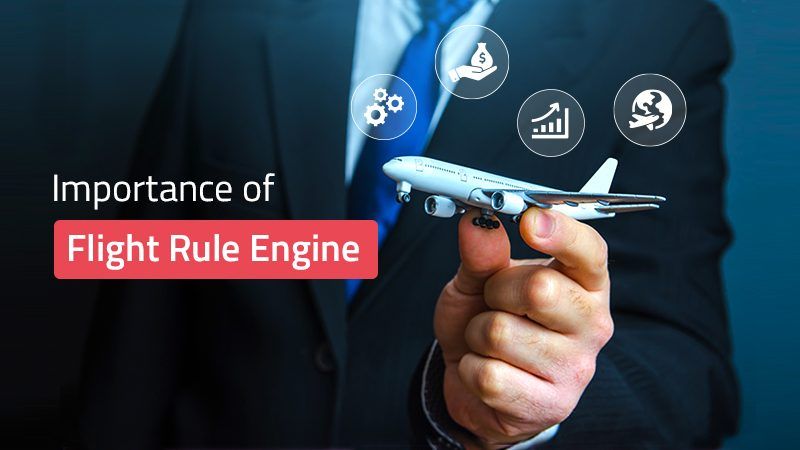The number of searches for flights is always higher than the number of flights booked. So, what’s stopping these customers from converting? Why is the ratio of views to bookings so skewed? Is it possible to solve this problem? Yes, with the Flight Rules Engine it is possible to increase the number of travelers booking with you. Offering competitive pricing by using various parameters of the flight rules engine is the way forward.
Selling flights that appeal to a wider audience is one way to increase sales. A comprehensive flight rules engine plays a very important role in ensuring you understand the searches happening on your website and get better conversion rates. Many services have been monetized by airlines. It could be anything, passengers may choose to pay extra for more legroom, excess baggage fees, extra fees for window seats, etc.
All passengers have different needs, so it all depends on how you serve different types of customers. People have different options and considering all these factors play a very important role, this is a highly competitive and low-margin segment for travel agencies. Your business needs to develop a differentiated pricing strategy based on passenger demand. The Flight Rules engine gives you complete flexibility and control to do this.
flight rules engine
Flight rules are a set of rules based on different conditions. The flight rules engine allows users to define rules that allow users to add markups or discounts to flight tickets. The rules engine allows travel companies to customize many aspects of the services they sell.
Flight rules can be defined by the flight rules engine, which can be done by using tools within the software and adding rules. In-flight bookings have different parameters and combinations that can be monetized using a separate tagging engine called the flight rules engine. It also allows you to create flight rules based on the consultant’s name, branch, agency, and currency.
Advantages of using flight rules engine
A number of different parameters and combinations allow you to manage your flight rules engine, giving you complete flexibility and margin control.
- Profit – The flight rules engine primarily helps travel companies generate booking profits through strategic markups and discounts.
- Inventory – A good pricing strategy can allow you to make healthy profits and allow you to sell more inventory.
Markups and discounts using the Flight Rules engine
Add markers during extensive travel
The flight rules engine allows you to add markups to make bigger profits when travel volume is higher.
For example, suppose a country is hosting a major sporting event, which means that the number of tourists traveling to that country is bound to be high. The flight rules engine allows you to add a markup to your ticket to that location during periods of high volume travel.
Drive sales with discounts
To sell specific types of inventory that traditionally sell less, you can use the flight rules engine to add discounts.
For example, demand for flights from India to Dubai is low in May. You can add discounts to make the overall price look attractive, thereby increasing sales.
Flight markups and discounts
Markups and discounts can be added for various airlines, travel classes and fare classes.
- airline- The flight rules engine allows you to add markups and discounts for the airlines you want to add.
- Travel Class – The flight rules engine allows you to add tags based on the class of air travel. For example, markups can be added for business class, premium economy, etc.
- Fare Class – Depending on the airline, the flight rules engine allows you to add markups or discounts to fare classes.
Markups and discounts on ancillary services
The flight rules engine allows you to add individual tags to ancillary and other options in your flight booking. In Ancillary Services, you can add markups and discounts for the following.
- meal- Add tags based on meal choices.
- luggage – Add a fee on top of the extra baggage rates offered by the airline. Add discounts for travelers traveling without luggage.
- seat- Apply markup or discount to selected seats.
- Convenience fee—— The flight rules engine lets you add or waive convenience fees.
eliminate
You can apply for an additional cancellation fee. Most cancellations result in losses for both customers and airlines, however, depending on your business strategy, you may choose to add a markup or forego it entirely.
WHAT OTRAMS OFFERS
OTRAMS allows you to calculate and add your markups, discounts with various options and combinations designed to increase revenue and sales.
- Multi-currency system: The availability of a currency matrix ensures that multiple currencies are available. This allows you to add markups or discounts in the currency of the country the traveler is visiting.
- mark: OTRAMS users can Add tag About various services. You can use it for ancillary services, cancellations, and more. You can add tags based on your business needs.
- Discount: OTRAMS allows you to add additional discounts to drive sales when needed. You can add discounts for various services.
The world of travel needs smart technology to boost profits and grow a healthy and sustainable business. Your business needs technology that can meet traveler needs and the ever-changing dynamics of the travel industry. OTRAMS has the technology and expertise to help your business earn greater profits and drive your business growth.
Get OTRAMS and increase your revenue with the intelligent flight rules engine.
We use cookies!
.
management consent
Privacy Overview
This website uses cookies to improve your experience while browsing the website. Out of these, the cookies that are categorized as necessary are stored on your browser as they are essential for the working of basic functionalities of the website. We also use third-party cookies to help us analyze and understand how you use this website. These cookies will be stored in your browser only with your consent. You can also opt out of these cookies. But opting out of some of these cookies may affect your browsing experience.
Necessary cookies are absolutely necessary for the website to function properly. These cookies anonymously ensure the basic functionalities and security features of the website.
| cookie | period | describe |
|---|---|---|
| cookielawinfo – checkbox analysis | 11 months | This cookie is set by the GDPR Cookie Consent plugin. This cookie is used to store the user’s consent to cookies in the “Analytics” category. |
| cookielawinfo-checkbox functionality | 11 months | This cookie is set by the GDPR cookie consent to record the user’s consent to cookies in the “Functionality” category. |
| cookielawinfo-checkbox-required | 11 months | This cookie is set by the GDPR Cookie Consent plugin. Cookies are used to store user consent for cookies in the “necessary” category. |
| cookielawinfo-checkbox-other | 11 months | This cookie is set by the GDPR Cookie Consent plugin. This cookie is used to store the user’s consent for cookies in the “Other” category. |
| cookielawinfo-checkbox-performance | 11 months | This cookie is set by the GDPR Cookie Consent plugin. This cookie is used to store the user’s consent to cookies in the “Performance” category. |
| View cookie policy | 11 months | This cookie is set by the GDPR Cookie Consent plugin and is used to store whether the user agrees to the use of cookies. It does not store any personal data. |
Functional cookies help perform certain functions such as sharing website content on social media platforms, collecting feedback and other third-party functions.
Performance cookies are used to understand and analyze key performance indicators of the website and help provide visitors with a better user experience.
Analytical cookies are used to understand how visitors interact with the website. These cookies help provide information on metrics such as visitor numbers, bounce rates, traffic sources, and more.
Advertising cookies are used to provide relevant advertising and marketing to our visitors. These cookies track visitors on the website and collect information to provide customized advertising.
Other unclassified cookies are those that are being analyzed and have not yet been classified.








